Toshiba Satellite L645D: Mobile AMD at 3GHz
by Dustin Sklavos on March 9, 2011 3:20 AM ESTMostly Portable
A point where AMD-based notebooks have traditionally suffered (with the notable exceptions of both Sony's EE34 and pretty much anything Fusion-based) is battery running time. Toshiba equips the L645D with a mediocre six-cell, 48Wh battery that may somewhat dampen the mobility of a notebook that's otherwise fairly portable.
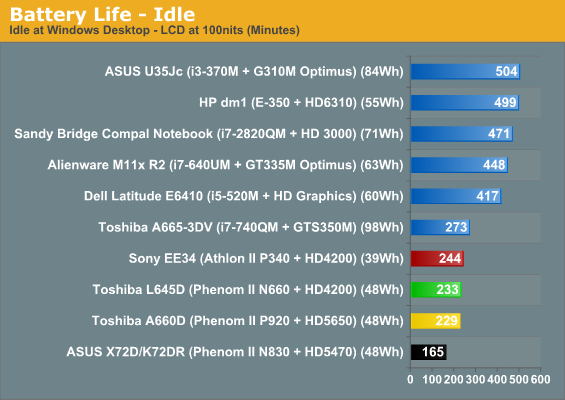
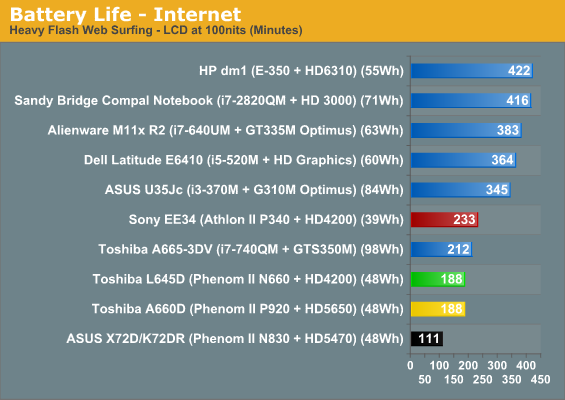
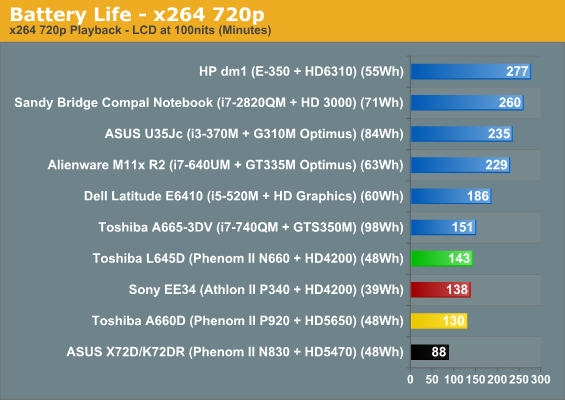
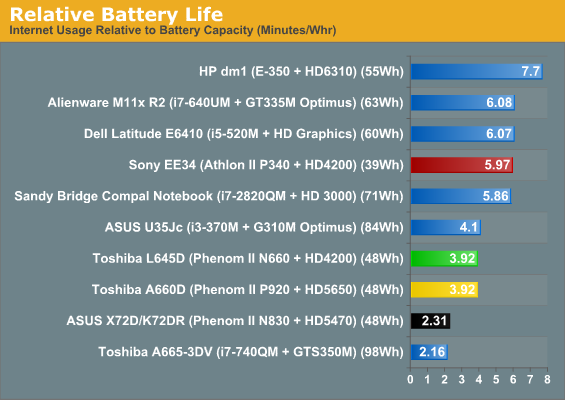
The relative battery life of the L645D isn't completely dire, but the Sony EE34's 25-watt processor runs roughshod over it. In practice, though, the L645D is still able to achieve three hours of useful running time surfing the internet. This is something Jarred's mentioned before and we've discussed at length: if you look at the running times of the Intel-based notebooks, you'll notice they're all equipped with much larger batteries. It seems like manufacturers almost deliberately cripple AMD-based notebooks.
We're not suggesting the L645D would offer battery life on par with an equivalent Intel machine, but it's still hamstrung by a middling battery. It's also clear there are power optimizations left on the table, as the Sony EE34 posts better battery life in two of the three tests despite having a smaller battery; the H.264 playback test is closer to what we'd expect, but the Internet test in particular has Sony leading by over 50% in relative battery life.
Heat and Noise
Given the smaller chassis of the L645D compared to some of the larger notebooks we've reviewed, it isn't unreasonable to expect it's going to have a tougher time dealing with the thermals of the Phenom II N660. We were pleasantly surprised.
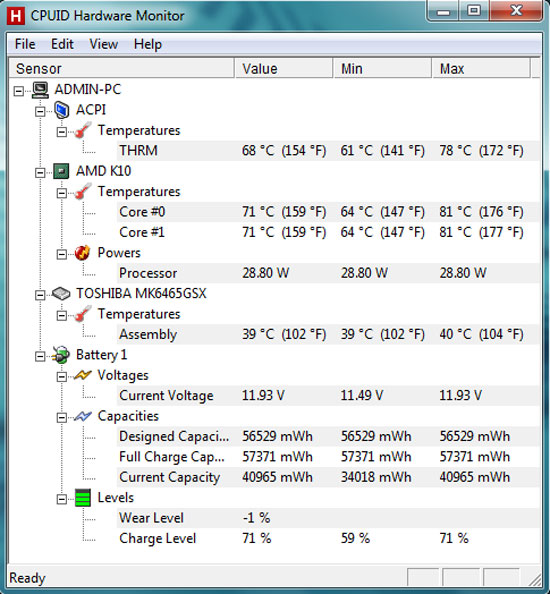
The processor temperatures are going to seem a little alarming, but they're not too far from where we've seen Arrandale-based notebooks hit. It may be better to look at the hard drive's temperature, which remains constant under both idle and load: 40C is perfectly reasonable. The L645D isn't in danger of overheating.
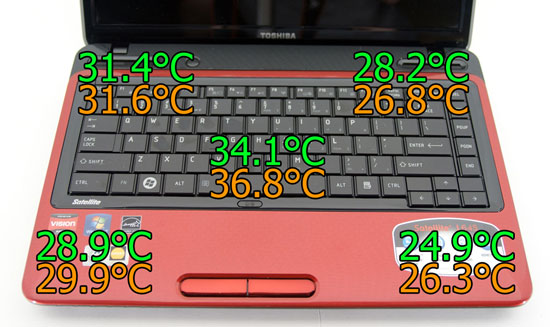
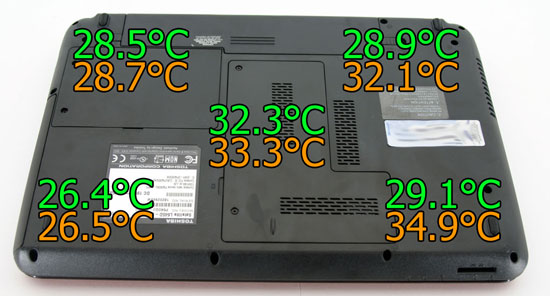
Idle and load surface temperatures are a little hotter than some of the other notebooks we've reviewed recently, but still nothing to complain about. Palmrests remain comfortably cool, as does the bottom of the notebook, with the center of the keyboard getting the hottest under sustained load. The central hot spot's 36.8C equates to roughly 100F, which is by no means cool but also not swelteringly hot either.
The L645D actually handles heat pretty well, and though the fan can definitely spin up noticeably under load, it's not aggravatingly loud and certainly not any louder than competing notebooks tend to be.










61 Comments
View All Comments
ArKritz - Wednesday, March 9, 2011 - link
I'm looking forward to a very different Toshiba: The Portege R830. If they've managed to get the noise level down (from the R630), or at least stable, and they've kept the anti-glare, I NEED THAT LAPTOP.Please, please, please don't refrain from reviewing it even if Toshiba also makes bad laptops.
Hrel - Wednesday, March 9, 2011 - link
1366x768 screen... done, right there. No need to read further, not interested.700 bucks with the inclusion of blu-ray? Please, keep your useless blu-ray drive give me a useable screen and drop that price down some. This isn't 700 dollar hardware, 500 tops given the performance and already outdated parts.
RamarC - Wednesday, March 9, 2011 - link
i understand why 1366x768 came to be (16:9), but i don't understand why it's practically the only alternative. where did 1280x800 go? and1600x900 is next-to-impossible to find without spending $1K.Althernai - Wednesday, March 9, 2011 - link
Most of the arguments in favor of this laptop seem to boil down to "it's only $619," but that is actually not that cheap nowadays. For example, HP's new ProBook 4430s (also 14" form factor, but with Sandy Bridge, a matte display and Professional rather than Home Premium Windows) is only $579. I guess you could make the argument "it's only $619 and it comes with a Blue Ray drive," but the notebook is pretty lousy in most other ways so it's probably not worth it unless you really want Blue Ray.alent1234 - Wednesday, March 9, 2011 - link
some people live with their computers and watch all their movies on their computers.laptops are a niche market where you try to make products for everyone's lifestyle. if you're a non-gamer and want something to watch your blu-ray collection on the road this is a good deal
it's not like the old days where you need a supercomputer to push HD video. a cell phone will do it these days
JarredWalton - Wednesday, March 9, 2011 - link
@RamarC: Keep in mind that the HP 4330S uses an i3-2310M (2.1GHz with no Turbo). Hyper-Threading will still put it ahead of the P660 in some performance benchmarks, but I'm not sure pure single-threaded performance will be one of them. Granted, the HD 3000 IGP is about twice as fast as the HD 4250 (at least when it all works properly, which is about 90% of the time), but while $579 isn't bad it's also not the greatest when you factor in everything else.Blu-ray combo drives for laptops are still over $100 (http://www.newegg.com/Product/Product.aspx?Item=N8... 640GB 5400RPM vs. 320GB 7200RPM is also about $30 more for the Toshiba drive (http://www.newegg.com/Product/Product.aspx?Item=N8... compared to http://www.newegg.com/Product/Product.aspx?Item=N8... So add $130 for comparison and you're talking about $710 versus $620. But you're right: the HP is probably still better for many simply because it will have better battery life, better build quality, and none of the glossy crap.
strikeback03 - Wednesday, March 9, 2011 - link
Is there a version of the Toshiba available without the Blu-Ray drive but all else the same? Because I can't see that being a major selling point for a lot of the budget market, given the listed HP plus $30 to match hard drives vs this Toshiba I'd think the majority of people would be better off with the HP for the same money.ImSpartacus - Wednesday, March 9, 2011 - link
I'm not sure how to interpret this comment. Is it a sentence? I'm definitely not an English major, so I don't know."I've griped about this before but it bears repeating: glossy plastic photographs reasonably well and that's about it, and using it on the keyboard is a horrendous idea."
What exactly is being said?
7Enigma - Wednesday, March 9, 2011 - link
What Dustin is saying is that glossy plastic looks good in photos (ie on a website, in a review article, on a sales circular), but in practice it's awful due to all the reflections and glare. And putting it on a keyboard where it's going to reflect is even worse since it is very close to the screen and much larger in area than the normal areas of complaint (wristpad for instance).Shadowmaster625 - Wednesday, March 9, 2011 - link
"I have complained about this in the past. Glossy black plastic only looks good to the people in the marketing department. Everyone else hates it. It definately should not be used on the keyboard."